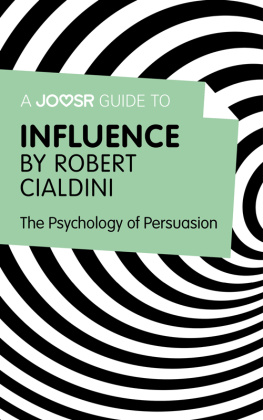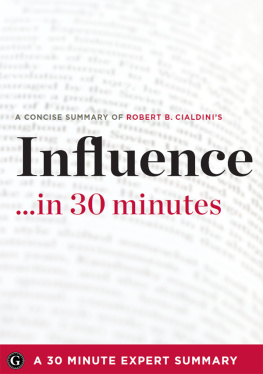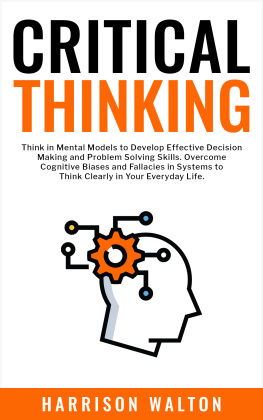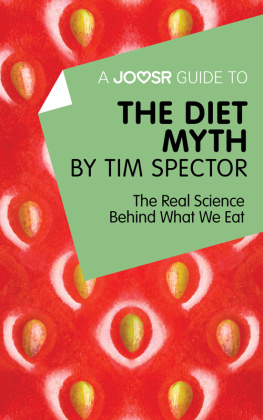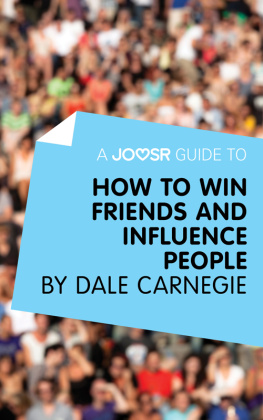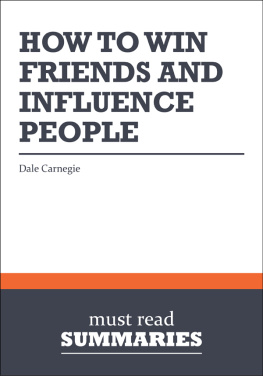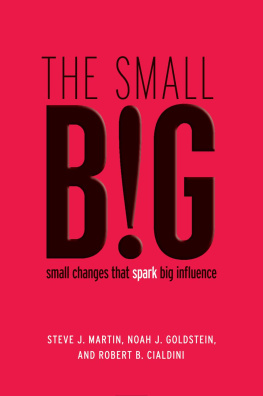INFLUENCE
BY ROBERT CIALDINI
The Psychology of Persuasion

Whats it about?
Yes or no? Its a simple question that we find ourselves answering several times a day as we make important decisions or agree to requests from friends, coworkers, and salesmen. Every day, were faced with decisions that require us to make a choice, but despite our best efforts, we sometimes find ourselves choosing an option wed actually rather not have. What makes us comply with requests we want nothing to do with? What is it about the way something is asked that can turn us from completely disinterested to readily accepting? Is there something in our minds that makes us comply?
The answer to this question lies in our natural human behaviorbehavior that is thoroughly understood by compliance professionals; people for whom their entire job depends on getting people to say yes. Sales associates, door-to-door salesmen, realtors, nonprofits, and more all rely on their understanding of human behavior to convince you to say yes to things, despite your own preference. These professionals use psychological principles and tactics known as weapons of influence to impact your thought processes, making it more likely that youll comply with their requests and sales pitches. In short, compliance professionals know just how to get you to agree with almost anything.
If this sounds like something you need to understand, Influence: The Psychology of Persuasion is here to help. This is a book about human behavior, and how the most-seasoned compliance professionals use that behavior for one very specific purpose: producing the word yes. It covers compliance psychology from two important angles: the scientific and the practical. Influence will guide you through a three-year study on the science and psychology behind compliance, giving you a thorough understanding of its basic principles. Youll also learn how that science is applied day to day by top compliance professionals, looking at the techniques, philosophies, and practices of the salesmen, advertisers, and pitchmen who make compliance their business. By reading Influence, youll discover how to spot their most cunning tactics before they can affect you, making sure you only say yes to what you really want.
Weapons of influence work because of our mental shortcuts
Before approaching the tactics themselves, we need to understand what in the human mind makes them work in the first place. To understand the tactics used by the best compliance professionalsor the tactics used by your persuasive friends and coworkersyou need to understand human nature and how it interacts with the world around you.
Humans live in a fast-paced world, where we are expected to do complex, intricate tasks just to function normally. Cooking, driving to work, interacting with people on the street, and operating a computer are all multifaceted tasks that require us to process a high amount of information rapidlyso rapidly, in fact, that our brains may not be able to process all of the information at once. The world around us wont slow down, so our brain develops handy mental shortcuts to help it keep up. These become automatic reactions to the regular situations that arise, letting us live life without having to process every single little detail that passes us.
These shortcuts are known as judgmental heuristics, and they make our everyday lives easier by causing certain inputs to trigger what our brain believes are appropriate responses. When a driver speeds up next to us, our mind triggers and assumes hes not going to let us pass on the road. When a shopkeeper sells something for a low price, a trigger in the brain tells us the item is cheap in quality. This kind of shortcut helps us make it through the day, but their control over our behavior is dangerous in the hands of people who understand it well. These trigger behaviors are the basis for the tactics used by the most-cunning compliance professionals, using well-honed inputs to push you towards saying yes.
To make it easier to understand them, these tactics can be sorted into six basic categories: likability, reciprocity, social proof, scarcity, commitment, and authority. Learning about these tricky tactics is criticalif you dont, you may find yourself vulnerable to them, making choices you dont want to be making.
Youre more likely to comply with someone you like
With compliance pros using so many sneaky tactics to get a yes out of you, you might feel its better to stick with the people you instinctively like. People you know from work and store employees youve grown fond of have already passed any moral test you may have, so it seems like youd be safe from influence tactics with them. But be carefulcompliance pros know the power of likability.
Statistically, youre twice as likely to agree with someone you like as opposed to someone youre simply indifferent over. That kind of statistic isnt something compliance professionals are willing to ignore, and over the years theyve managed to figure out three main things that make someone stand out in a persons mind.
First, people tend to gravitate to other people who are similar to them. Youre more likely to buy from someone with a common dress style or shared interests, and the pros know this. Second, we respond well to complimentsand not just overt compliments. Some salesmen have begun sending follow-up emails to customers, checking in on prior purchases and chatting in a friendly, personal manner that makes the customer feel like the salesman wants to get to know them. And third, its widely accepted that being attractive makes things easier, but the benefits go far deeper. When we see someone we find attractive, our minds attach positive personality traits such as honesty and talent to them, whether or not they deserve them. To take advantage of this, shops hire attractive salespeople that we feel good about talking to. Advertisers take this one step further by hiring good-looking actors and actresses to promote their products, knowing well attach positive feelings to them before they even say a word. Events like sales parties (where your friend sells you products in a social setting) and salespeople who try to get you to like them are everywhere, so how do we defend ourselves against them? It of course doesnt make sense to simply stop liking people, and its impossible even if we wanted to. Instead, we need to focus on the effect the likable person is trying to bring about. If you notice yourself suddenly liking someone youve only just met, take a moment to ask yourself why. If you realize theyre trying to get you to agree with something, youll know to be alert.
The reciprocity rule turns gifts into debts
When someone does you a favor or gives you a gift, its common courtesy to pay them back. Its kind, fair, and a very civil way of making sure kindness has rewards. But what if someone were to exploit that kindness? What if someone were to do you a favor just to get something they want in return? Tactics like this fall under the category of reciprocity.
Reciprocity refers to a subconscious rule ingrained into every humans mind. The rule simply says that if someone does something benevolent to or for us, we are obligated to do something in return. For example, if someone sends us a gift on our birthday, we should remember to send one on theirs. If someone helps us wash our car, we should help them clean their yard.
This subconscious rule is found in some form in every human society across the globe, and its a powerful motivator. People dont want to be seen as someone who takes and takes without giving back, so they feel obligated to return any kindnessand that obligation is exactly what compliance professionals want to generate. The reciprocity rule is so powerful and deeply ingrained in our minds that it can get positive responses from situations where negatives would be entirely rational. In experiments, its been found that a person is likely to do a favor for someone whos given them a gift, regardless of whether or not they even like the gift-giver.
Next page
